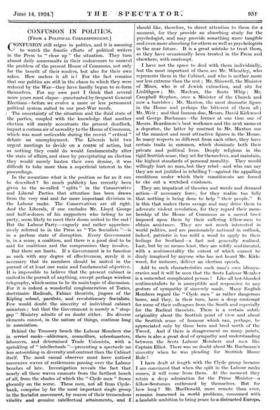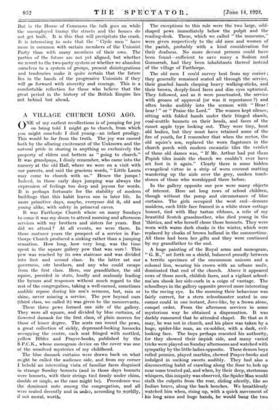C 0/sTFUSION still reigns in politics, and it is .amusing to
watch the frantic efforts of political 'writers in the Press to "clear up" the situation. They turn almost daily somersaults in their endeavours to unravel the problem of the present House of Commons, not only for the benefit of their readers, but also for their own sakes. How useless it all is ! For the fact remains that our politics are still in the chaos to which they were reduced by the War—they have hardly begun to re-form themselves. 'For my own part I think that several more years must elapse—p-unctuated by frequent General Elections—before we evolve a more or less permanent political system suited to our post-War needs.
The uncertainty of the situation and the fluid state of the parties, coupled with the knowledge that another election will merely accentuate the present deadlock, impart a curious air of unreality to the House of Commons, which was most noticeable during the recent" critical-" debate on unemployment. The Liberals held two urgent meetings to decide on a course of action, but as nothing they could do would fundamentally alter the state of affairs, and since by precipitating an election they would- merely hasten their own demise, it was difficult to take more than a superficial interest in the proceedings.
In the meantime what is the position so far as it can be described ? So much publicity has recently been given to the so-called " splits " in the Conservative and Liberal Parties that attention has been drawn from the very real and- -far more important divisions in the Labour ranks. The Conservatives are all right. And the Liberals, if one excludes Mr. Lloyd George and half-a-dozen of his supporters who belong to no party, seem likely to meet their doom united to the end ! But the Labour Party—vaguely and rather apprehen- sively referred to in the Press as "The Socialists "—is in a parlous state of disruption. Every Government is, in a sense, a coalition, and there is a good deal to be said for coalitions and the compromises they involve. - Rut there are limits. If a Government is to• function as such with any degree of effectiveness, surely it is necessary that its members should be united in the pursuit of at least one main and fundamental objective. It is impossible to believe that the present cabinet is united.in the pursuit of anything, except perhaps wireless telegraphy, which seems to be its main topic of discussion. For it is indeed a wonderful conglomeration of Tories, doctrinaire Radicals, Fabian theorists, jingoes of the ICipling .school, _ paeifists, and. revolutionary Socialists, Few would doubt the sincerity of individual cabinet ministers ; but that the Government is merely a "stop. gap" Ministry admits. of no doubt either. Its diverse elements cannot, in. the nature of things, continue long in association.
Behind the Treasury bench the- Labour Members rise in serried -ranks--aldermen, eouncillers, schoolmasters; labourers, and determined Trade Unionists, with a sprinkling of " intellectuals "presenting a spectacle- no less astonishing in diversity and contrast than the Cabinet itself. The most casual observer must have noticed successive waves of. restlessness passing over -the Labour benches of late. Investigation reveals the fact that nearly all these waves emanate from the farthest bench of all, from the shades of which the "Clyde men" frown gloomily on the scene. These men, not all from Clyde- bank, comprise by far the- most important single group in the Socialist movement, by- reason of their tremendous vitality and- genuine -intellectual attainments, and should like, therefore, to direct attention to them for a moment, for they provide an absorbing study for the psychologist, and may provide something more tangible and even more absorbing for others as well as psychologists in the near future. It is a great mistake to treat them as they have occasionally been treated in the Press and elsewhere, with contempt.
I have not the space to deal with them individually, but the most important of them. are Mr. Wheatley, who represents them in the Cabinet, and who is neither more nor less extreme than the rest ; Mr. Shinwell, the Minister of Mines, who is of Jewish extraction, and sits for Linlithgow ; Mr. Maclean, the Scots Whip ; Mr. Campbell Stephen, once a Minister of the Church and now a barrister ; Mr. Maxton, the most dramatic figure in the House and perhaps the bitterest of them all ; ; and.that famous,duo, Messrs. David Kirkwood and George Buchanan—the former at one time one of Messrs. Beardmore's best workmen and the next moment a deportee, the latter by contrast to Mr. Maxton one of the sunniest and most attractive figures in the House. In many respects so different from each other, they have certain traits in common, which dominate both their private and political lives. Deeply religious in the rigid Scottish sense, they set for themselves, and maintain, the highest standards of personal morality. They would willingly hurt no man, but they rebel—and who, can say they_are not justified. in rebelling ?—against the appalling conditions under which their constituents are forced to eke out a wretched existence.
They arc impatient of theories and words and demand action—if necessary force, for they realize too fully that -nothing is being done to help "their people." It is this that makes them savage and may drive them to advocate violent revolution, for they regard their mem- bership of the House of Commons as a sacred trust imposed upon them by their suffering fellow-men to obtain assistance. They are not much interested in world politics, and are passionately national in outlook, indeed, patriotic is too mild a word to apply to their feelings for Scotland—a fact not generally realized. Last, but by no means least, they are wildly sentimental, with a sentimentality the extent of which cannot be dimly imagined by anyone who has not heard Mr. Kirk- wood, for instance, deliver an election speech.
Add to such characteristics each man's own idiosyn- crasies and-it will be seen that the Scots Labour Member is a somewhat complicated person ! Like all hot-blooded sentimentalists he is susceptible and responsive to any gesture of sympathy if sincerely made. Many English Members- regard the "Clyde men" as rather dangerous bores, and they, in their- turn, have a deep contempt for some of their colleagues from the South and especially for the Radical theorists. There is a certain subtle originality about the Scottish point of view and about the Scottish sense of humour which- can, perhaps, be appreciated only by those born and bred north of the Tweed. And if there is disagreement on many points, there-is-also a great deal of sympathy and -understanding between the Scots Labour Members and men like Captain Elliot. There was no doubt about Mr. Buchanan's sincerity when he was pleading for Scottish Home Rule !
I have dealt at length with the Clyde group because I am convinced that when the split in the Labour ranks comes, it will come from them. At the moment they retain a deep admiration for the Prime Minister—a fellow-Scotsman enthroned by themselves. But for how long ? Mr. MacDonald, more remote than ever, remains immersed in world problems, consumed -with a laudable ambition to bring peace to.adistraeted Europe. But hi the House of Commons thc talk goes on .while the unemployed tramp- the streets and, the hones do not get built. It is this that will precipitate the crash. It is interesting to note that the "Clyde men" have more in common with certain .members of the Unionist Party than with many members of their own. The parties of the future are not yet aligned; but whether We revert to the two-party system' or whether we abandon ourselves to a system of grotips, present disintegrations and tendencies make it quite Certain that the future lies in the hands of the progressive Unionists if they will go forward with sincerity and courage. This is a comfortable reflection for' those Who believe that• the great period in the history of the British Empire lies not behind but ahead.











































 Previous page
Previous page